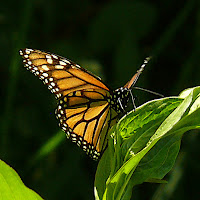This morning I visited my 108-year-old friend at her nursing home. (To guard her privacy, I’ll call her Fran). I think it’s safe to say that, during each of my twice-weekly visits over the past year—as we’ve chatted, as I’ve read the newspaper to her or played her favorite music—she’s never once remained awake for more than ten minutes at a time.
Today was very different. She likes going outdoors, but between days too cool or hot and those with air quality alerts, we haven’t had many chances to do so. Today’s nearly perfect, so I wheeled her down five floors and out into the residence’s beautiful inner garden courtyard.
Her favorite place to stop and sit is right in front of the first of the gardens’ three waterfalls. That spot was in full, early-July sun, so I was concerned she might get too warm, but she said it felt good.
Fran’s hearing relies on one temperamental hearing aid, and she has trouble speaking clearly, but today she could hear both the waterfall and me, and we fell into an easy conversation.
We started talking about water, about seeing it as if for the very first time. Its stunning clarity, the way it feels on one’s skin, and, as Fran put it, the music it makes as it trips and tottles its way over rocks.
"I’m so glad you brought me out here!”
Her eyes welled up with tears.
At one point, after a brief silence. Fran turned to me and said haltingly, “I just love this; I’m so glad you brought me out here!” Her eyes welled up with tears as she said it, and I realized what a gift this little outing must have been for one whose day-in, day-out confinement starves her of Nature’s wonders.
MIRROR IMAGE
In the U.S and many other cultures of the developed world, childhood brings us as close to Nature as we’ll ever get. Then we grow up, tie ourselves to our education, careers and homes, and many of us forget what it was like to be one with the natural world.
I’ve always felt that the end of a human being’s life should be more like a mirror image of its beginning. Specifically, wouldn’t it make sense that Nature play as big a role in our health and happiness when we’re old as when we were young?
This is one of the reasons I originally signed up for visiting Fran and other old folks in nursing homes. I imagined myself in those well-worn shoes and how diminished mobility and the realities of institutional living can lead to one’s estrangement from Nature. I thought I could change that.
This morning Fran more than affirmed that hope.
The most important implement I can
bring is the turning of a door handle.
BELONGING
I always bring with me to my visits with Fran my “tool kit” of things to read, pictures to look at, music to listen to, perhaps a few games to play. So, whatever diversion she’s in the mood for, I’ll have what we need.
I hope with all my heart that this will be the case for me. That when I’ve lost my precious abilities to walk and climb and paddle…and see, someone will be kind enough to lend me those capacities. Take me outdoors with the animals and plants, the moving air and singing water, and let Nature replenish my soul with her perfect, timeless beauty and wisdom.
















